
JOURNAL OF THE ELECTROCHEMICAL SOCIETY
Scope & Guideline
Fostering Collaborative Progress in Electrochemical Science
Introduction
Aims and Scopes
- Electrochemical Energy Storage:
Research on battery technologies, including lithium-ion, sodium-ion, and other emerging battery systems, focusing on improving capacity, cycle stability, and efficiency. - Electrocatalysis and Fuel Cells:
Studies on electrocatalysts for fuel cells, including the development of novel materials and the optimization of performance for hydrogen production and CO2 reduction. - Sensors and Detection Technologies:
Development of electrochemical sensors for the detection of various analytes, including environmental pollutants, biological markers, and food contaminants. - Corrosion Science:
Investigation into the mechanisms of corrosion and the development of protective coatings and materials to enhance durability in electrochemical systems. - Electrochemical Interfaces and Mechanisms:
Studies focusing on the interfacial phenomena in electrochemical systems, including solid-electrolyte interfaces, reaction kinetics, and mass transport. - Materials Development and Characterization:
Research on new materials for electrochemical applications, including nanomaterials, metal-organic frameworks, and composites, with a focus on their electrochemical properties.
Trending and Emerging
- Solid-State and Next-Generation Batteries:
Research on solid-state batteries and next-generation lithium-ion technologies is gaining momentum, focusing on improving energy density, safety, and longevity. - Electrocatalysis for CO2 Reduction:
There is an increasing emphasis on electrocatalytic processes aimed at CO2 reduction, reflecting global sustainability goals and the need for carbon-neutral technologies. - Nanomaterials and Hybrid Systems:
The use of nanomaterials and hybrid systems in electrochemical applications is trending, with research focusing on enhancing performance and efficiency in batteries and sensors. - Smart and Flexible Electrochemical Sensors:
The development of innovative, flexible, and smart electrochemical sensors for real-time monitoring of environmental and biological systems is on the rise, showcasing the integration of advanced materials and technologies. - Machine Learning and Data-Driven Approaches:
The application of machine learning and advanced data analytics in electrochemical research is emerging, particularly for predictive modeling and optimization of electrochemical systems.
Declining or Waning
- Traditional Corrosion Studies:
While corrosion remains a significant area of research, the focus has shifted towards more innovative approaches and materials, leading to a decline in traditional corrosion studies that do not incorporate new technologies or materials. - Basic Electrochemical Theory Applications:
Research papers that primarily focus on basic theoretical applications of electrochemistry without integration into practical or applied contexts have become less common, as the community increasingly values applied research. - Conventional Battery Technologies:
Research on conventional lead-acid and nickel-metal hydride batteries has waned as interest grows in next-generation battery technologies such as lithium-sulfur and solid-state batteries. - Low-Temperature Fuel Cell Research:
There appears to be a diminishing trend in publications focused on low-temperature fuel cell technologies, as research interests have shifted towards high-temperature and solid oxide fuel cells.
Similar Journals
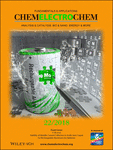
ChemElectroChem
Advancing the frontiers of catalysis and electrochemistry.ChemElectroChem is a premier open-access journal published by WILEY-V C H VERLAG GMBH, focusing on the interdisciplinary fields of catalysis and electrochemistry. Established in 2014 and actively publishing until 2024, this journal boasts an impressive reputation, currently ranked in the Q2 category for both catalysis and electrochemistry according to the 2023 metrics. With an Scopus ranking placing it in the 74th percentile for Electrochemistry and 61st for Chemical Engineering and Catalysis, ChemElectroChem serves as an essential platform for researchers, professionals, and students dedicated to advancing knowledge and fostering innovation in these critical scientific domains. Since its transition to open access in 2023, the journal aims to maximize the dissemination of cutting-edge research and facilitate the exchange of ideas among global scholars, thereby enhancing the accessibility and impact of high-quality science within the community. For those engaged in the ever-evolving conversations around energy storage, conversion processes, and sustainable solutions, ChemElectroChem is an invaluable resource.
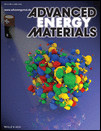
Advanced Energy Materials
Advancing Knowledge for a Greener FutureAdvanced Energy Materials is a leading academic journal published by WILEY-V C H VERLAG GMBH, focusing on the rapidly evolving fields of materials science and renewable energy technologies. With an impressive impact factor and recognition as a top-tier journal, it ranks within the Q1 category in both Materials Science (miscellaneous) and Renewable Energy, Sustainability and the Environment as of 2023. Spanning from 2011 to 2024, the journal serves as an essential platform for researchers, professionals, and students eager to explore groundbreaking advancements in energy materials, fostering innovative solutions to global sustainability challenges. The journal's authoritative content is supported by rigorous peer review, ensuring high-quality research contributes to the academic community and beyond. Located in Weinheim, Germany, Advanced Energy Materials stands at the forefront of scientific inquiry, making it an invaluable resource for those invested in the future of energy and materials science.
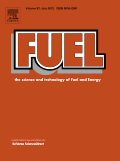
Fuel
Transforming Energy Challenges into SolutionsFuel is a premier international journal published by Elsevier Science Ltd, showcasing critical advancements and insights in the fields of chemical engineering, energy engineering, power technology, and organic chemistry. With a significant history dating back to 1922 and continuous publication from 1970 to 2025, Fuel holds an impressive position in the academic community, reflected in its top-tier rankings—Q1 in multiple categories including Fuel Technology and Chemical Engineering for the year 2023. This journal is dedicated to exploring innovative research and application of fuel technologies, driving forward the dialogue on sustainable energy solutions. Researchers and professionals alike will find Fuel to be an essential resource, providing access to high-impact articles that contribute to advancements in methodologies and applications, while navigating the complexities of global energy challenges.
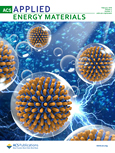
ACS Applied Energy Materials
Exploring Cutting-edge Advances in Energy SystemsACS Applied Energy Materials, published by the American Chemical Society, is a premier journal dedicated to the cutting-edge fields of energy materials, chemical engineering, and electrochemistry. With an impressive impact factor and consistently ranked in the Q1 category across multiple disciplines—including Chemical Engineering, Electrical and Electronic Engineering, and Materials Chemistry—this journal serves as a pivotal platform for researchers and professionals focused on innovative solutions for energy systems and materials science. Since its inception in 2018, ACS Applied Energy Materials has been committed to disseminating high-quality research that addresses pressing energy challenges, promoting sustainability and efficiency in various applications. Its competitive Scopus rankings reflect the journal's influence and relevance within the academic community, making it an essential resource for anyone looking to stay at the forefront of energy materials research.
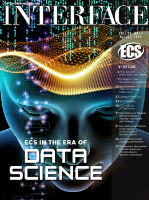
Electrochemical Society Interface
Empowering Innovation through Electrochemical InsightsElectrochemical Society Interface is a prominent journal within the field of electrochemistry, published by the Electrochemical Society Inc. The journal, carrying the ISSN 1064-8208 and E-ISSN 1944-8783, serves as a vital platform for researchers, professionals, and students alike, aiming to bridge the gap between cutting-edge research and practical applications in the electrochemical domain. With a convergence period spanning from 1992 to 2024, the journal enjoys a respectable ranking in the Q3 Quartile of the 2023 Electrochemistry category. Although it does not currently offer open access options, its articles provide valuable insights into various aspects of electrochemical research and technology, enhancing the scholarly communication in this important field. By maintaining high standards in research dissemination, Electrochemical Society Interface continues to foster innovation and contributes significantly to the developments in electrochemical processes and materials.
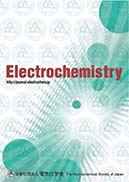
ELECTROCHEMISTRY
Advancing Electrochemical Innovation WorldwideELECTROCHEMISTRY is an esteemed journal published by the Electrochemical Society of Japan, dedicated to advancing the field of electrochemical science and technology. With an ISSN of 1344-3542 and an E-ISSN of 2186-2451, this journal has been providing a platform for scholarly communication since its inception in 1996, with a converged scope extending to 2024. As an Open Access publication since 2020, it facilitates the wide dissemination of research, fostering collaboration among researchers, professionals, and students alike. Currently positioned in Q3 of the electrochemistry category and ranking 52 out of 60 in Scopus, ELECTROCHEMISTRY is committed to publishing high-quality, peer-reviewed articles that explore novel electrochemical systems, applications, and methodologies. With its base in Tokyo, Japan, the journal serves a global audience, promoting cutting-edge research that drives innovation in energy, materials science, and analytical chemistry.
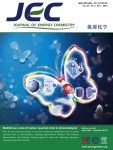
Journal of Energy Chemistry
Empowering Research in Electrochemistry and BeyondThe Journal of Energy Chemistry, published by Elsevier, is a premier international journal that has established itself at the forefront of research in the fields of electrochemistry and energy technology. With an impressive impact factor, this journal is classified in the Q1 quartile across multiple categories including Energy Engineering and Power Technology, Fuel Technology, and Electrochemistry, underscoring its significant contribution to advancing knowledge and innovation in energy systems. Based in the Netherlands, the journal offers open access to its cutting-edge research, allowing for broad dissemination and engagement among researchers, professionals, and students alike. The scope of the journal spans crucial topics from chemical energy storage to sustainable energy solutions, making it an essential resource for those looking to understand and contribute to the evolving landscape of energy chemistry.

Energy Material Advances
Empowering Innovation in Energy ResearchEnergy Material Advances, published by the American Association for the Advancement of Science, stands at the forefront of energy research, showcasing groundbreaking studies in the realm of renewable energy, fuel technology, and materials science. With the journal's commitment to open access since 2020, it aims to democratize knowledge and foster innovation across a global community of researchers, professionals, and students. The journal boasts an impressive impact factor, placing it firmly within the Q1 category across multiple disciplines including Energy (miscellaneous), Fuel Technology, and Renewable Energy, Sustainability and the Environment, highlighting its significance in advancing scholarly discussions. In the latest Scopus rankings, Energy Material Advances ranks among the top 10% of journals in its field, affirming its role as a pivotal resource for current and emerging trends in energy materials. The journal is dedicated to facilitating collaborative efforts and inspiring novel approaches to the challenges posed by energy sustainability and technological advancement.
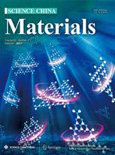
Science China-Materials
Advancing the Frontiers of Materials Science.Science China-Materials is an esteemed peer-reviewed journal dedicated to advancing the field of materials science, published by SCIENCE PRESS. With a strong focus on innovative research and applications, this journal provides an essential platform for disseminating groundbreaking findings in materials development, characterization, and engineering. Since its inception, Science China-Materials has achieved an impressive Q1 ranking in the Materials Science (miscellaneous) category, reflecting its commitment to quality and the impact of its publications, as indicated by its 86th percentile ranking in Scopus. The journal is set to converge its contributions from 2016 to 2024, making it a vital resource for researchers and professionals interested in the latest advancements and trends in materials science. As an open access publication, it ensures that knowledge is freely available to a global audience, promoting collaboration and innovation across disciplines. The journal is headquartered in Beijing, China, and continues to attract high-quality submissions from leading experts in the field.

International Journal of Electrochemical Science
Advancing the frontiers of electrochemical research.International Journal of Electrochemical Science is a peer-reviewed journal dedicated to disseminating cutting-edge research in the field of electrochemistry. Published by Elsevier in Serbia, this journal serves as a vital platform for scientists and researchers to explore innovative electrochemical techniques, processes, and applications. With an ISSN of 1452-3981, it has been a respected source of scholarly articles since its inception in 2006 and continues to bridge the gap between theoretical advancements and practical implementations up until 2024. Notably, it holds a Q4 quartile ranking in the field of electrochemistry and ranks 41 out of 60 in the Scopus database, situating it within the 32nd percentile among its peers. The journal champions open academic discourse, contributing significantly to the advancement of knowledge in electrochemical sciences, making it an essential resource for researchers, professionals, and students alike who are striving towards new discoveries and innovations.